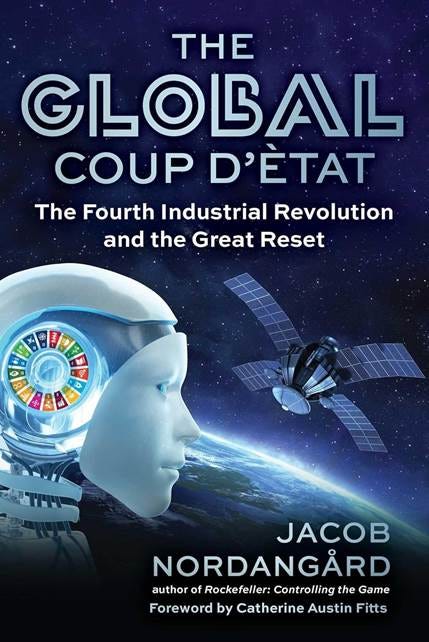This week in the pod I interview
social theorist, heavy metal musician, former environmentalist and author. He has published two important books for the dissident movement, The Global Coup d'État: The Fourth Industrial Revolution and the Great Reset and Rockefeller: Controlling the Game both published by Skyhorse in 2024 (with earlier versions in Swedish). In this lively conversation, Jacob and I talk about his PhD research on the politics of climate science and how his interrogation of Swedish biofuel policy de-railed his academic career – a very stressful experience initially, but ultimately for the better, he contends.Publishing this interview leaves me a little nervous because I worry that what’s left of my left readers (and friends) will think I have gone completely bonkers, down the proverbial rabbit hole and into what Naomi ‘Doppelgänger’ Klein disparagingly calls ‘the mirror world’. Here, those of us who became Covid (or gender) contrarians have ostensibly landed, inside an incendiary ‘right-wing’ echo chamber gradually losing touch with ‘reality’. This is especially salient as the Antipodean normies are jubilant about the Labour victory over the weekend. The is not how I see it and I have a longer academic article expounding on this point; however, for now I will simply sketch the middle ground I inhabit on the matter of climate, together with the interview, and send you on your way to make up your own mind.
First up, we know like all culture war issues—think sex and gender, Israel and Palestine, Covid and of course climate—the views ‘on each side’ are polarised in such a way that they cannot make use of the strengths of different ‘opposing’ arguments.[1] This means that each side gets dumber and the middle gets hollowed out. In a free society, truth is finessed through opposition, specifically good faith arguments between the most articulate proponents of any given view, thrashed out in the public square for all to see. The masses can then chew on the cognitive cud and arrive at their own conclusions. This is not ‘both sidesism’ it’s ‘every side-ism’ and precisely why the public square should be neutral among ends. Often a centrist consensus emerges but it is formed and nourished by the outsiders, contrarians, mystics and visionaries. Now that these folks are all censored, de-platformed and banished to their respective (echo) chambers, the public is becoming dumber and dumber. We see this clearly in the climate issue.
In his fabulous essay, ‘Riding the Climate Taboggan’ (2023), John Michael Greer says,
Every year or two on this blog I post an update on the global climate. Now and then I wonder if this is a futile effort. Outside the four notional walls of this one little blog on the fringe, and a few other equally marginal venues, the rest of the world seems to be caught up in a debate about the climate that permits two and only two viewpoints. On the one side you have the people who insist that global climate change is an apocalyptic horror that will surely kill us all unless we kowtow to an increasingly baroque and intrusive set of rules that they themselves aren’t willing to follow. On the other side you have the people who insist that global climate change isn’t happening at all. They’re both wrong, but that hardly matters: with every failed prediction—and both sides have made a good many of these—the shrieking from the true believers just gets louder, drowning out the few voices of moderation in between.
Then the moment passes, and perspective returns. One of the great lessons of history is that there really are limits to how long you can talk people into disbelieving the evidence of their own senses. To cite only one example, all those supposedly authoritative claims that the vaccines would keep you from catching or transmitting the Covid virus didn’t keep people from noticing that the vaccines did neither of these things, which is one of several reasons why attempts to push yet another round of Covid vaccines on the public are doing so poorly. In the same way, the rhetoric on both sides of the climate change issue is losing its appeal as people notice that the climate really is changing, but the predicted apocalypse keeps on pulling a no-show.
He goes on to adumbrate in some detail how and why the climate is changing, and why the apocalypse will continue to stand us up. You can read it here. Amidst the mountain of data, the point I find most compelling is a very small one he makes towards the end: ‘The Earth’s atmosphere is far more complex than our current models can handle’.
Just over two centuries of mechanistic science means we no longer comprehend nature—or any phenomena for that matter—as an integrated whole with a dynamic multiplicity of moving parts. We think of climate as somehow separate from forests, soils, grasses, animals and oceans and this is a grave mistake, since each have an impact, and together they are a veritable symphony of interdependent variables. Although this is understood at an abstract level, time and again, we see mechanistic thinking getting in the way of truth.
One of the most powerful recent examples concerns the reintroduction of wolves to Yellowstone Park. The wolves were hunted to extinction, along with the other apex predators in the 1920s, which had a deleterious effect on the trees since they no longer kept the foliage-eating elk in check. Over time, the whole ecosystem was reduced to a barren wasteland. Reintroducing wolves greatly enhanced the woodland however it also had an effect on vegetation which attracted birds, and on the river consolidating the banks which created habitat for long lost beavers and supported water flow, in turn creating estuaries which brought back water birds. The transformation was truly astonishing. Whoever would have thought that a wolf could heal a river, and in turn create a ‘trophic cascade’ of species renewal?
Similarly, we now understand the gut-brain connection as integral to mental health and, in what seems like more than an analogy, the mycelial-tree connection, supporting an astonishingly complex set of relationships in a forest between ‘mother trees’ and their offspring. Here too there are ‘hidden conversations’ scientists have only just started listening to. There are so many interdependent forces impacting climate balance and imbalance.
This makes predictions that humans will be extinct by 2026 fraught (to say the least). As one pithy commenter under this video put it, ‘I’m willing to place a $5000 bet that humans will still be around in 2027’. Like COVID-19, climate change predictions—i.e., the data that drives policy, law and cultural discussion in this area—are based on modelling, and in the words of the world’s foremost statistician, John Ioannidis, in relation to ‘the pandemic’, ‘forecasting failed’. It doesn’t mean all climate modelling is wrong (see the climate taboggan), but it is not a perfect mirror of reality either.
The other notable perspective ventilated by several legacy environmentalists concerns the capitalist wagon nowadays hitched to environmentalist horse. We have moved from protecting and preserving nature to the tokenisation of everything. The new corporate environmentalism has very little to do with preserving nature and everything to do with commodifying it. Here we see the confluence of mountain top removal with carbon credit schemes. We arrive at the absurd position of destroying nature to ‘save’ nature, or at least its fractionalised digital twin. It’s kinda like ‘saving women’ by legally divesting women of their own category and allowing men who identify as women into women’s sports teams, prisons and toilets. Same problem, same playbook. It’s Trojan horse activism.
In a recent interview with The Free Press, Paul Kingsnorth makes clear his middle path: a love of nature, an acceptance that we are exceeding planetary limits and a rejection of corporate environmentalism.
It was really a question of joining the dots. If you love the natural world, you look out and you see the natural world being destroyed, you try to stop it. But then the question you ask is, why are they building these motorways? Why do they want to increase traffic levels? Why do we need to drive faster? Why do we have this developing economy? And you start to join the dots and you start to see how consumerism works and how capitalism works and how industrialism works. And really, what I was realizing over all of that time is that—and I still believe this to be the case now—that the modern industrial economy, which brings us plenty of material benefits, is also a giant colonial machine that destroys the natural world and turns that bounty into product for us. And I could see that going on everywhere, and I became very passionate about it. And being very young and strong-willed, I thought we could save the world.
Back in the 1990s, climate change was not on the front page of all the papers. People didn’t even really know what it was. Nobody talked about sustainability. There was no “net zero.” There was none of this stuff. It was long before all the corporations and the politicians decided they were going to run with this agenda, which back at the time we would have dreamed of happening [my emphasis]. It didn’t quite turn out the way we thought.
So, the problem with extant environmentalism is not ‘saving the planet’—a preposterous phrase on reflection—it is with the money-making racket of corporate capture. There is also the matter of ‘post-normal science’, which Sylvio Funtowicz explains, ‘comes into play for decision-making on policy issues where facts are uncertain, values in dispute, stakes high and decisions urgent’.
In early 2024 I was asked to review a paper on ‘climate anxiety’ submitted to a psychoanalytic journal. It was at this point that I found the receipts for my position. Here is an excerpt from my (anonymous/peer) review,
In addition to heavy reliance on others’ research, there is insufficient awareness of one of the two central topics under discussion: climate science. The author is (I suspect unwittingly) partisan on this issue. While there is academic consensus regarding climate change, there remain notable outliers including Nobel Laureate Professor John Clauser,[2] [3] Emeritus Professor Judith Curry,[4] [5] Professor Steven Koonin,[6] and Emeritus Professor William Happer[7] about how much, and the causes and consequences of this change. For an accessible summary of these positions see Climate: The Movie.
These critics, many senior and/or distinguished scholars from Ivy League institutions, claim that funding schemes and vested interests have captured the universities, making alternative views—including alternative research questions and interpretation of the data—difficult to express. Can they all be written off as cranks? Moreover, as many of these scholars point out, the IPCC models are abstractions that posit different scenarios, which means climate science rests not on certainty but, rather, on a (contested) balance of probabilities. It is in this nexus that serious debate lies. The earth is warming, yes, but by how much and at what cost, is far from clear.
Moreover, if we accept that the earth is warming, what to do about it is also highly contested. Legacy environmentalists including Derek Jensen and Lierre Keith oppose ‘bright green’ solutions that rely much more heavily on fossil fuels than most people realise; indeed, wind and solar can’t work without fossil fuels. See also Ozzie Zehner’s, Green Illusions. Moreover, so-called green corporations are often owned by the same mega wealthy oligarchs who own the oil companies. They are engaged in extremely environmentally destructive practices in the name of ‘green energy’, including mountain-top removal, highly polluting electric cars and solar panels, and the mass destruction of the great—often endangered—birds and bats in wind turbines (including hawks, eagles, owls etc.). They outline this argument with evidence in their book Bright Green Lies.[8] The movie by Jeff Biggs and Michael Moore, Planet of the Humans covers essentially the same territory.
A key feature of all these arguments is that that regulatory and institutional capture of the universities and media (i.e., vested interests are funding both), is skewing research, including the research questions that can be asked, and destroying academic freedom. Others such as environmental activist Michael Schellenberger, author of Apocalypse Never, suggests that clean nuclear energy is the only way to transition the energy needs of industrial civilization without devastating consequences—i.e., societal collapse—and therefore we are morally beholden to look into this solution.
Needless to say, I did not recommend publication. But, of course, it is likely me that will not be asked back to peer review, rather than there being any appreciable increase in viewpoint diversity.
Back to Jacob Nordangård. In Rockefeller: Controlling the Game he reveals, to quote the dustjacket,
the thrilling and paradoxical story of how the family that made the world dependent on oil, has funded environmental and climate research since the 1950s, helped shape climate policy since the 1980s, and supported climate activism since the 1990s.
As we explore in our interview, Nordangård’s PhD research revealed this seemingly bizarre duplicity and together with it the Rockefeller’s integral role in the birth of philanthrocapitalism. In an effort, to rehabilitate their reputation after the Ludlow massacre (1914), the Rockefeller’s hired public relations founder, Ivy Lee (who in a reverse Operation Paperclip was also hired by the NAZIS to advise on propaganda techniques and foreign relations). Not unlike Bill Gates today, the Rockefeller’s were reinvented as generous philanthropists who cared about people and the environment.
Lee’s dictum was ‘always tell the truth’, but give it the gloss required to control the narrative. Public relations was not simply advertising, it was a response to the rise of mass society and an emergent public sphere in which impression management was pre-requisite to successful business. Telling the truth meant being the teller of the truth that the public believe. Public relations was invented to create, massage, gloss and pitch ‘the truth’ between different constituents inside ‘the public’.
As Nordangård explains, after the Ludlow massacre and its catastrophic reputation damage, Rockefeller senior decided he would ‘tell the truth’ by buying and funding the newspapers (media) and universities. In this way, he wasn’t going to be stabbed in the back by the truth, he got out in front and determined it from the outset!
The Rockefeller family’s long-standing battle against climate change, according to Nordangård, ‘contains elements of sophisticated propaganda techniques, futurism, and New Age philosophy’ with a view to transforming ‘economy, ecology, culture, and humanity itself’. The book examines the family’s ‘unprecedented influence over areas such as education, medicine, agriculture, art, architecture, population control and geopolitics’.
In the forward to his subsequent book, Catherine Austin Fitts writes,
The Global Coup d’État extends the analysis in Rockefeller and does so with the benefit of the global unmasking of tyranny that has occurred since 2019—spurred by the COVID-19 pandemic and its acceleration of what I call “the great poisoning,” as well as by the central bankers’ Going Direct Reset, which has engineered global financial consolidation on a previously unimaginable scale.
Engineering central control takes a lot of work—and it leaves a document trail. Dr. Nordangård has taken great care to map out the people, groups, events, and regulatory frameworks that have been and are being used to consolidate and justify global power. His attention to detail alongside a remarkable ability for synthesis create a work that is unusually well done and easy to follow.
He is also skilled in translating the official narratives used to market the changes underway into the actual technocratic details—the nuts and bolts of tyranny.
The Global Coup d’État makes it much easier to see the control grid slowly closing in around us. It also makes it much easier for you to back out of that control grid—in your work, in your choice of media and banks, in your investments, and in your choice of companions and communities.
We don’t have to slide into tyranny, especially if we can see it coming. So, take a deep breath and dive in—you are about to get a heavy dose of actionable intelligence, one that can help you avoid an enormous number of deep-state traps.
You can listen to the podcast on Apple, Podbean and watch it here and on YouTube.
Notes
[1] This is not ‘both sidesism’ – e.g., I do not think there is any grounds on which to annihilate the population of Gaza or lockdown whole populations for years. In matters of culture and philosophy however, truth is finessed in the cross hairs of conflict and opposition.
[2] https://co2coalition.org/publications/nobel-laureate-john-clauser-elected-to-co2-coalition-board-of-directors/
[3] https://clintel.org/nobel-prize-winner-dr-john-f-clauser-signs-the-clintel-world-climate-declaration/
[4] Judith Curry, Climate Uncertainty and Risk: Rethinking Our Response, Anthem Press, 2023. See also ‘“There’s no emergency” – dissident climatologist Dr Judith Curry on climate change’.
[5] https://judithcurry.com/2012/06/22/science-held-hostage-in-climate-debate/
[6] Unsettled (2021 book). See also ‘Unsettling climate science’, 2023.
[7] The Truth about greenhouse gasses: https://www.thegwpf.org/images/stories/gwpf-reports/happer-the_truth_about_greenhouse_gases.pdf
[8] https://www.brightgreenlies.com/













Share this post